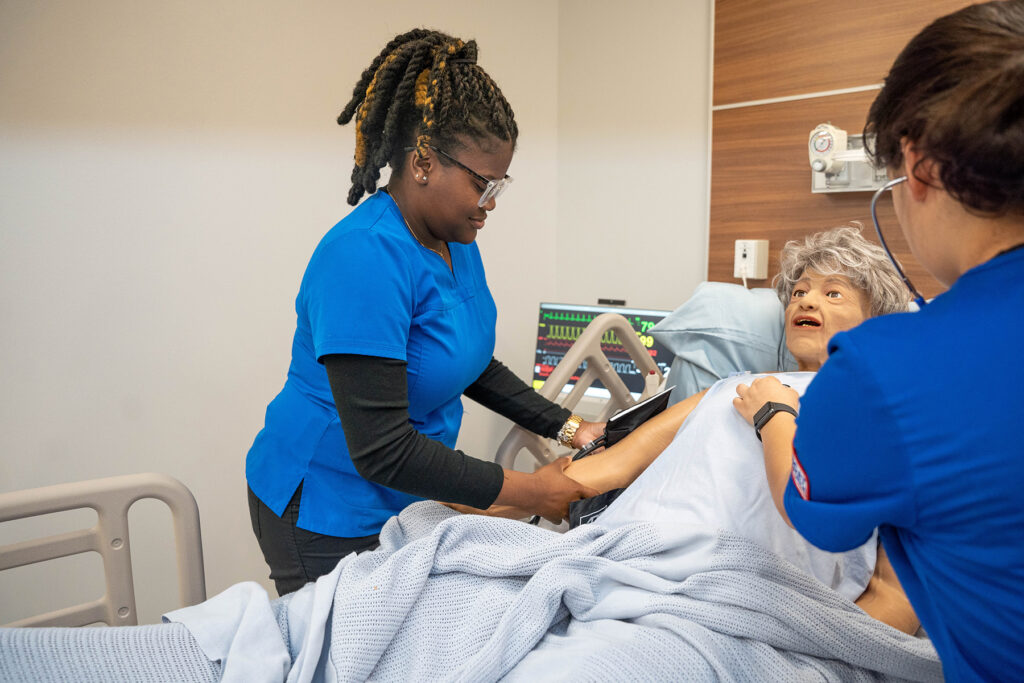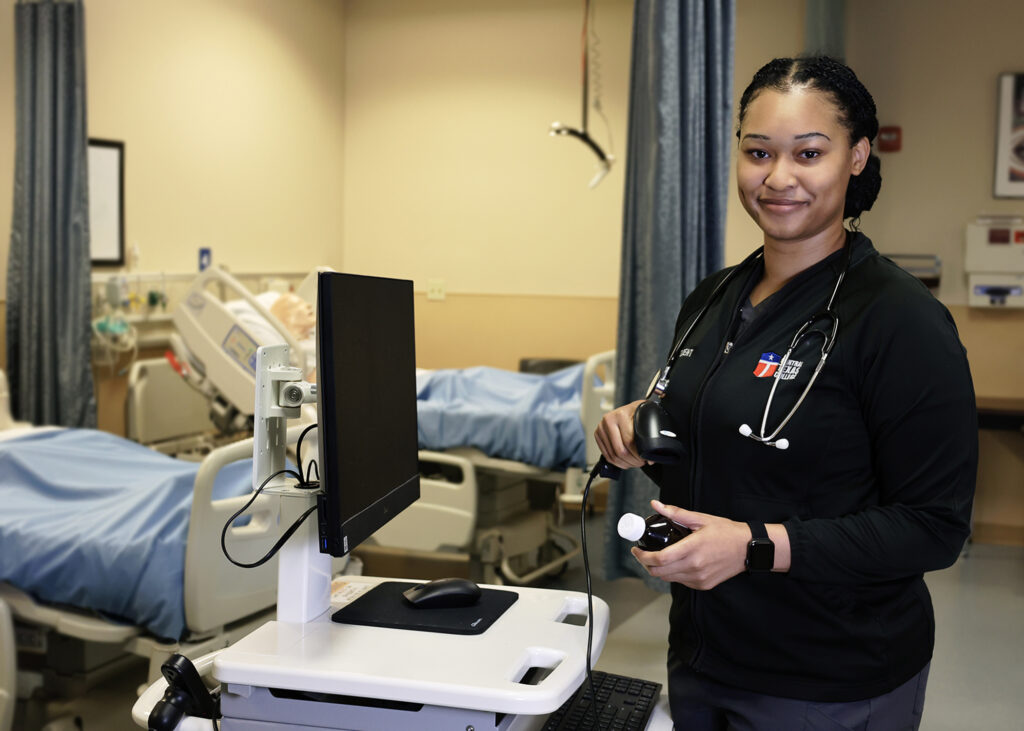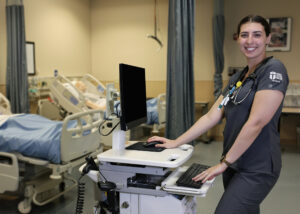Learning to Heal: Area boasts many health care education options
By TONYA WARREN | Photos courtesy of Temple ISD and Central Texas College
Have you ever heard a kid shout they wanted to be a firefighter after they blew out candles on their brightly colored fire engine shaped birthday cake? Perhaps you remember dressing up as Clara Barton, the unflinching, no-nonsense Civil War nurse for elementary school history day? Maybe you’re even currently exploring new career options. The various pathways to a health care career are robust in our local area, and that’s something to feel great about.
The days of high schools offering only a few classes to introduce students to nursing or physical therapy have gone the way of Trapper Keepers and Boy George posters (hopefully). Today, high schoolers and adults wanting to pursue a career in the ever exciting, ever growing, world of health care have a lot of educational avenues.
As of April 2024, the U.S. Bureau of Labor Statistics noted an extremely positive outlook for health care jobs. For example, the growth rate of registered nursing jobs is predicted to be six percent from 2022-2032. According to their statistics, about 193,100 job openings for registered nurses are projected each year for the next decade. Their website offers comprehensive information on job outlooks, salaries, minimal educational entry level requirements and a general overview of what types of employers hire for each position listed. For example, a radiology technician might work in an urban hospital or an independent health care clinic. Nurses are employed by schools, hospitals, doctor’s offices, cruise ships and more. An EMT paramedic might work for the county or a private health care center. A pharmacy technician has options of working in a hospital, retail or other areas.

High Schools
Temple, Belton, and Killeen high schools offer health care pathways to students interested in health care post-graduation. These pathways lay out the required course work needed for successful completion. These courses also gauge student interest before a considerable amount of time, effort and money are spent. For example, a student might decide they don’t like the sight of blood, so studying phlebotomy (blood drawing and more) might not be for them. High school counselors are invaluable in helping guide students in career choices.
Temple and Killeen high schools offer certified medical assistant and pharmacy technician training. Killeen also offers classes for basic emergency medical technician, registered dental assistant with X-ray certification and more.
Temple students studying to be certified nursing assistants train in the on-campus clinical training labs, complete with hospital beds, EKG machines and more. Pharmacy technician students enjoy learning in a mock pharmacy lab on campus. Health care offerings are very popular among students according to staff who keep a finger on the pulse of such things.
“More than 10 percent of students chose to study three or more classes in the health science field,” said Sara Bartlett, Temple’s Career and Technical Education director.
It’s exciting to observe students finding their way in the career world and there’s much to learn in health care careers. Anna Lajarin, a senior from Harker Heights High School attends the Killeen ISD Career Center and wants to become a dentist.
“The program at the Killeen ISD Career Center is helping me gain hands-on experiences with dentistry,” she said. “We learned early on about ethics and laws prior to hands-on experience.”
She also said she learned time management, learning in a fast-paced environment and seeing procedures in action. Karen Rudolph, Executive Director of Communications and Marketing with Killeen schools said, “out of 13 career clusters offered, health science is number one, and this meets the state definition of in demand and high wage.”
Diagnostic and therapeutic pathways are available for Belton students interested in a future health care career. According to the BISD website, the diagnostic pathway “introduces students to occupations and educational opportunities related to performing complex medical laboratory tests for the diagnosis, treatment, and prevention of disease.”
Think blood labs, radiologic testing, and more. Students have benefited from Baylor Scott and White lab staff assisting with teaching phlebotomy and discussing real-life scenarios. On the therapeutic side, students learn about caring for patients with acute, episodic, or chronic illnesses. Understanding rehabilitative care, such as caring for patients in nursing homes or those with disabilities or developmental delays are also important topics in patient care. At the completion of all course work, students qualify to take certification exams for patient care technician, EKG technician, and more.

Colleges
If you need classes close to home or work, consider Temple College, where this past year 15% of its students were enrolled in the health professions. Eric Eckert, Executive Director of Strategic Communications and Outreach, believes Temple College is a jewel in Central Texas.
“All of the health professions have high licensure pass rates, high retention rates, and high job-placement rates,” he said. “Employers consistently tell us that our students outperform those from other institutions.”
Speaking of employers, Eckert noted the college works closely with the local community to meet changing health care and industry needs. For instance, a polysomnography (sleep study) program and echocardiogram (heart diagnostic) program were recently added, per requests by local health care providers.
“The college is also preparing to launch a program that will provide neurodiagnostic (brain wave activity) technicians to the community,” Eckert said.
Successful surgical technology graduate, Lacy Lanig, said she chose the college “because it is well known for being a great school. Students are held to high standards, and the health programs produce successful professionals after graduation.”
 Central Texas College is located just outside Fort Cavazos and offers an array of health care career options to veterans, active military and civilians. Direct patient care pathways such as nursing and not-so-hands-on fields such as medical laboratory technology or histology are popular offerings. Students are prepared to take the credentialing exam, as appropriate, at the completion of all coursework.
Central Texas College is located just outside Fort Cavazos and offers an array of health care career options to veterans, active military and civilians. Direct patient care pathways such as nursing and not-so-hands-on fields such as medical laboratory technology or histology are popular offerings. Students are prepared to take the credentialing exam, as appropriate, at the completion of all coursework.
Certain character traits are needed for success in the above fields. An admirable hard work ethic, perseverance, excellent communication skills, a strong desire to learn, and more are all skills needed to succeed in any job but especially a job that entails working with people who are ill, in pain, and stressed over their health, finances and more.
The Pew Research Center, a nonpartisan Washington, D.C., think tank on social and other societal aspects of daily living, noted in 2020 that “social and fundamental skills still reign supreme within occupations.” Simply put, those traits that make us better humans such as kindness, compassion, and patience are especially needed with vulnerable populations, such as the above example.
Belton’s serene University of Mary Hardin-Baylor is also an integral part of the formal health care education in Central Texas. Its Master of Science in Physician Assistant program is the most popular offering, according to Melissa Williams, UMHB’s Director of Strategic Engagement in the Mayborn College of Health Sciences. Other offered programs include nursing, Doctor of Physical Therapy, Master of Science in Occupational Therapy, and more. The very essence of effective and compassionate patient care begins with each professional understanding a holistic approach in care.
“We seek students who are leaders and desire to become stronger leaders in their professional practice,” Williams said. She explained that “an emphasis on interprofessional education is woven into each program, and it’s essential for students to learn and understand one another’s roles in the health care community and within patient care.”
Changes in health care are constantly occurring at breakneck speed. New technologies, new medications, concern over the role of artificial intelligence, longer lifespans, staff shortages, reimbursement issues and more are just a few of the challenges we will face moving forward to promote and maintain healthy populations. Bell County can certainly say with pride that the educational systems in place are preparing students of today for the health needs of tomorrow.




